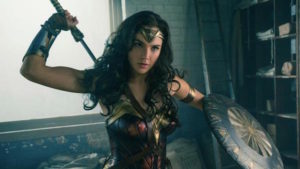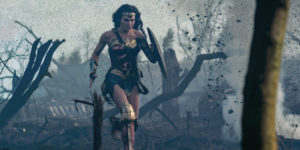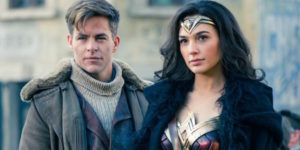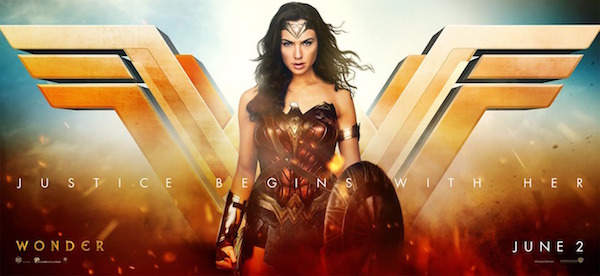Wonder Woman
Reviewed by Gavin Burrows 08-Jul-17
After decades of cosplay which should have inured us against this, Gadot doesn’t look like she’s dressed up as Wonder Woman – she just looks like Wonder Woman. In a film about an icon, she looks iconic.
Wonder Woman, as any fan knows, was the first major female hero to star in the comics in her own right. Her predecessors had just been feminised variant of male characters. So it’s fitting she should get the first major female superhero film. (At least the first DCEU one, and the first anyone actually gives a damn about.)
Though it says something about the state of the DC Universe films that their best shot so far mostly reminds you of the Marvel movies. Ostensibly you might expect her nearest neighbour to be Thor, in his first outing. After all, both were heroic figures from mythology who came to encounter our Earth. But in fact it’s Captain America. And, despite both being heroes from wartime, it’s less Cap from the World War Two setting of his first film and more the present-day sequel – Winter Soldier. And there’s two reasons for that.
The opening scenes are set in Diana’s home, Themyscira. (Known to us oldsters as the more pronounceable Paradise Island.) And the film foregrounds its juxtaposition between its bright colours and the grey, gritty world of war, by the conceit of the German crew sailing through thick fog then suddenly crashing past the threshold into bright sunshine. (And this, Grimdark proponents, is how you do it. It’s by playing all the keys on the piano that you make the black ones sound black.)
And like Cap, Diana remains a piece of this idealised bright colour in our more morally ambiguous world. Superheroes often sport emblems on their uniforms, but Diana and Cap both become themselves emblems even within their stories. And, despite the order the films have come in, historically this was a feature of DC. Marvel characters tended to be darker and more conflicted, DC heroes nobler and more square-jawed. And that’s a hard thing to pull off convincingly. As a child, that was largely why I preferred Marvel comics. Superman seemed something of a goody two shoes, better suited to infographics on child smoking posters than actual comic strips.
 But it works here, largely because Gal Gadot so looks the part. This is little to do with her acting ability, which seems limited. Noticeably she’s… well, the technical term used by intellectual film critics is “stunning”. But, really, there’s more to it than that. After decades of cosplay which should have inured us against this, Gadot doesn’t look like she’s dressed up as Wonder Woman – she just looks like Wonder Woman. In a film about an icon, she looks iconic. This is hard to quantify, and might seem merely subjective. But it’s a core component of the film. I never bothered with Superman vs. Batman, but most seemed agreed she stole the show with little more than a cameo.
But it works here, largely because Gal Gadot so looks the part. This is little to do with her acting ability, which seems limited. Noticeably she’s… well, the technical term used by intellectual film critics is “stunning”. But, really, there’s more to it than that. After decades of cosplay which should have inured us against this, Gadot doesn’t look like she’s dressed up as Wonder Woman – she just looks like Wonder Woman. In a film about an icon, she looks iconic. This is hard to quantify, and might seem merely subjective. But it’s a core component of the film. I never bothered with Superman vs. Batman, but most seemed agreed she stole the show with little more than a cameo.
In fact there’s times the film almost starts to resemble George Bernard Shaw’s Saint Joan. Diana’s not just a fighter but a rallier of troops, a figurehead come to life, to the point where that pretty much becomes one of her powers. People disbelieve her far-fetched origin story and mission statement, as much as they did Joan’s voices. But like Joan they tend to go along with her anyway. Disregarding a brief bar brawl, only in the finale does she fight alone.
But in a break from Cap comparisons, the World War she leaves Paradise for is the First one, presumably because that’s a better fit for her “war is bad, peace better” moral. Yet it has an odd effect. It’s doesn’t matter much that Themyscira plays fast and loose with Greek mythology, as we have a less personalised and more flexible relationship with it. But the First World War is different. It doesn’t seem just morally muddier than the Second, but literally muddier. It’s visceral and immediate, an army-sized standoff, its iconography blasted trees and twisted bodies dangling on barbed wire. So First World War films tend to be docudramas having expressionist nightmares, such as All Quiet On the Western Front or Paths Of Glory. And of course superheroes, as we commonly think of them, don’t appear until after this era. (In the real world, Wonder Woman herself didn’t appear until 1941 and, unsurprisingly, fought Nazis.)
But then there’s Nazis anyway. Popular culture loves Nazis (try not to quote that out of context) because they’re ready-made bad guys, so the film can’t really resist. And it then takes the slightly odd decision to make an actual German general, Ludendorff, into the chief antagonist, while not only making him a Nazi but a fully fledged movie Nazi, plotting against everybody around him while messing around with magic potions. (Including one which bestows super-strength. Luckily it never occurs to him to give it to his troops.) He’s the Red Skull with a real person’s name attached.
A scene where he bumps off his fellow Generals seems there to separate him from them, as if he was the only proto-Nazi of the bunch. Whereas the actual relationship with Nazism of the German military, as with most of the aristocracy, was much murkier. By taking all this on, the film is probably heading into waters it can’t navigate.
 How bothered you are by any of this is brought to a head in the central scene where Diana impulsively charges across No Man’s Land. And everyone follows her, into seeming certain death. Instead of saying “months since I’ve seen a she-male, and blimey look at the pins on that one. Shame about her being shot to bits, eh matey? More char then?” Like they actually would.
How bothered you are by any of this is brought to a head in the central scene where Diana impulsively charges across No Man’s Land. And everyone follows her, into seeming certain death. Instead of saying “months since I’ve seen a she-male, and blimey look at the pins on that one. Shame about her being shot to bits, eh matey? More char then?” Like they actually would.
But providing you can forget every single thing you know about the First World War, even while being barraged by reminders of it, the scene has pluses. For one thing its the most anti-grimdark moment in the whole film. It’s the one point where Diana takes time off from her mission, to find and take out Ares, and she does it to save the lives of villagers she’s never even seen. In Polygon, Eric Weiss makes the valid point that superhero films seem to have less and less actual heroism in them, that their fights have become grudge matches between brooding Gods. This scene short-circuits all of that. Yes it stretches credulity. But shouldn’t superhero films go for endearingly daft rather than believable?
The second similarity to Winter Soldier is the way Diana’s relationship to Steve Trevor mirrors Cap’s to the Black Widow. The characters aren’t the same, but their partnership works in a similar way. There’s the high-minded, heroic one and the spy, more accustomed to realpolitik, whose hands come ready-dirtied. One has a magic truth-telling lasso, the other virtually lies for a living. Except there’s a major difference, which is largely down to Winter Soldier not being Cap’s first film.
Diana’s not referred to as Wonder Woman at any point, because all this is about how she came to take up that mantle. The film is one long origin story. In a reversal of roles, once Steve has successfully passed on his world-view to her, his story mission is done and he can die. And the film is all about clearing a path for her to come to that moment. The Refusal of the Call for example, despite being such a building block of Hollywood screenwriting, simply doesn’t come up. Seeing Steve’s plane crash, she unhesitatingly sea-dives to rescue him. She’s later told by her mother she can’t leave the island, but there’s no pretence made she ever considers complying with this.
 Yet her continuing insistence that slaying Ares will stop the war at a stroke is single-minded to the point of simple-minded. The film is all about her coming round to Steve’s perspective, accepting the world is more complex than she’d assumed. And Steve’s perspective is of course also ours; we watch, waiting for the moment where she has to wise up. The notion that each has their own positive qualities, that they work best as a team, is rather undermined by Steve being right on this basic point.
Yet her continuing insistence that slaying Ares will stop the war at a stroke is single-minded to the point of simple-minded. The film is all about her coming round to Steve’s perspective, accepting the world is more complex than she’d assumed. And Steve’s perspective is of course also ours; we watch, waiting for the moment where she has to wise up. The notion that each has their own positive qualities, that they work best as a team, is rather undermined by Steve being right on this basic point.
In fact, it’s such child logic that, if there’s Cap and the Black Widow, there’s also something of Korben and Leeloo from The Fifth Element. A woman’s alien-ness comes across as child-like and so she needs a male figure to make up a combination of teacher, father and boyfriend. In other words, for all its games with reversing gender tropes there’s still something gender essentialist at the core of it. Diana is the heart, acting on impulse, believing in love, to which Steve is the counselling head. (Katniss in The Hunger Games might make another interesting comparison.)
And even if we are to have this structure, it would have been more radical to make her entirely wrong about Ares. Rather than have Diana mistake his identity and mission, what if he’d never been there? Outside Themyscira all the Gods had long since expired, and the bad which men did had simply been done by men. Diana would them have to find it within herself to rejoin the fight, knowing there could never be a final victory.
Wonder Woman of course risks becoming merely Stripperific, where the poster girl for love and justice is really just a poster girl. If the film has flaws its premise does always seem to be that Diana is a character, and one we will want to follow. Logan had seemed a film for someone like me, who’d been reading about the exploits of superheroes for so many years they were starting to get long in the tooth themselves. In contrast, even while watching Wonder Woman, I kept thinking that its perfect audience would be tween and teenage girls.
Tags: Allan Heinberg, DCEU, Gal Gadot, movie reviews, Patty Jenkins, Wonder Woman